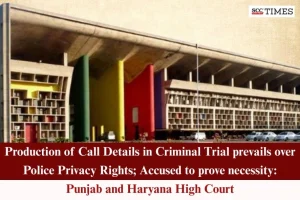Punjab and Haryana High Court: In a petition filed by the petitioner-accused challenging the order passed by the Additional Sessions Judge whereby his application under Section 94 of the Bharatiya Nagarik Suraksha Sanhita, 2023 (‘BNSS’), seeking call data records (‘CDRs’) and mobile location data was dismissed in FIR under Sections 18 and 20 of the Narcotic Drugs and Psychotropic Substances Act, 1985 (‘NDPS Act’), a Single Judge Bench of Yashvir Singh Rathor, J., held that the denial of an adequate opportunity to the accused by non-production of the electronic record, which stood admissible under Section 62 and 63 of the Bhartiya Sakshya Adhiniyam, 2023 (‘BSA’) in criminal trial, would amount to miscarriage of justice. Accordingly, the Court set aside the impugned order.
Background
In February 2024, upon receiving secret information that the accused along with another person was attempting to sell some intoxicating substance, police went on patrolling duty. On seeing the police party, the accused and co-accused tried to flee from the spot but were apprehended. Upon checking, 900 grams of charas was recovered from the accused and 315 grams of opium was recovered from the co-accused. The said contraband was then taken into police possession.
The accused filed an application under Section 94 of the BNSS seeking production of mobile location of Sub-Inspectors and Tehsildar which was dismissed by the Additional Sessions Judge
The accused contended that the Court failed to appreciate that it was necessary that mobile tower location and SDRs of officials be preserved so that he could defend his case. Per contra, the respondent argued that the accused had no right to claim the said information as, the same would amount to violation of privacy of the police officials concerned.
Analysis and Decision
Considering Section 94 of the BNSS, the Court opined that the production as well as requisitioning of the call details and mobile tower location details would be necessary, otherwise the same would be lost forever. The Court stated that
“No doubt while issuing the appropriate directions for preserving and production of call details/tower location details under Section 94 of the BNSS would violate the right to privacy of the police officials but the right of the accused under Article 21 of the Constitution in ensuring free and fair investigation/trial would prevail over the right to privacy of the police officials.”
Further, the Court opined that some extent of privacy could be breached in production of the said call details, as this would facilitate the Trial Court in discovering the truth and rendering justice, which would be fair to all stakeholders. The denial of an adequate opportunity to the accused by non-production of the electronic record, which is admissible under Sections 62 and 63 of the BSA in criminal trial, would amount to miscarriage of justice.
The Court emphasized that Section 94 of the BNSS helped in facilitating a fair and just resolution to the case by ensuring that relevant evidence was made available to the Court for making informed decisions and arriving at a just and fair outcome. It enabled the Court to secure important documentary evidence that would be in the possession of individuals or organization and helped prevent the destruction, tampering or loss of crucial documents, thereby maintaining the integrity of the judicial process. The Court stated that
“The power under 94 BNSS must be exercised for production of such evidence, which would assist the Court in discovering the truth in the pursuit of justice. However, the right of privacy of the police officials cannot be breached at the ipse dixit of the accused.”
The Court opined that before any such order for production of call details/tower location was passed, the accused was required to prove the necessity and desirability of such evidence, which would be relevant to establish the guilt or innocence of the accused.
Hence, the Court set aside the impugned order and directed the Trial Court to pass necessary directions under Section 94 BNSS for preserving and production of the call details/tower location details of the mobile numbers concerned and to inform the telecom operation on time as a record was preserved only for two years.
[Mukesh Dutt v. State of Haryana, 2025 SCC OnLine P&H 14470, decided on 20-11-2025]
Advocates who appeared in this case:
For the Petitioner: Nishant Chauhan, Advocate
For the Respondent: Jasmine Gill, AAG, Haryana

